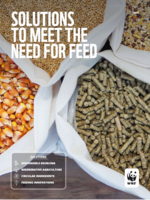Solutions to Meet the Need for Feed
-
Date:
March 08, 2023
-
This publication relates to:
Livestock and poultry have been a valuable part of the global agricultural landscape for millennia. As global meat production has quadrupled over the past fifty years, the corresponding growth in production and consumption of animal products and feed requires increased attention to the impacts of these intertwined systems and processes. As a component of the food system’s footprint, animal-sourced foods currently account for 11% of global greenhouse gas emissions, 12% of global freshwater consumption and have been responsible for 65% of global land use change from 1961-2011. Collective action across the feed value chain can deliver positive impacts to climate, biodiversity, water use, and protection of critical landscapes.
This white paper highlights how solutions that address Responsible Sourcing, Regenerative Agriculture, Circular Ingredients, and Feeding Innovations can support aligned efforts to meet corporate and national climate commitments while building climate resilience for feed systems.
